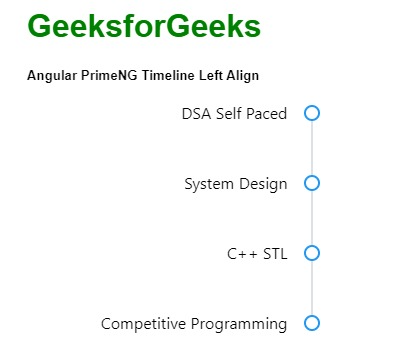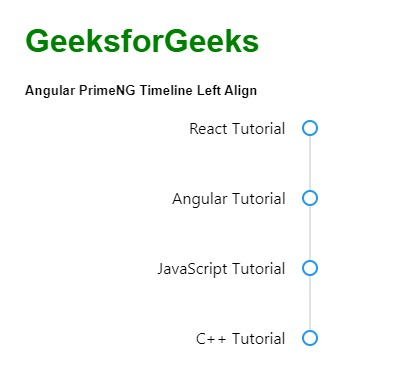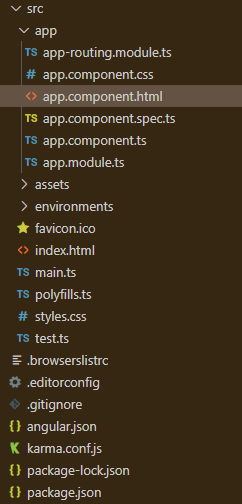Angular PrimeNG时间线布局
Angular PrimeNG是一个开源框架,拥有丰富的原生Angular UI组件,可以用来做很好的造型,这个框架用来做响应式网站非常方便。本文将向我们展示如何在Angular PrimeNG中使用时间线布局。我们还将学习一些属性,以及在代码中使用的语法。
时间线组件用于显示进程的时间线。
语法:
<p-timeline [value]="...." layout="....">
<ng-template pTemplate="content" let-event>
{{event}}
</ng-template>
</p-timeline>
Angular PrimeNG时间线布局属性:
- value。它是一个要显示的事件数组。它是数组的数据类型,默认值为空。
- layout。它是时间线的方向。它是字符串数据类型,默认值是垂直。
创建Angular应用程序和模块安装。
第1步:使用以下命令创建一个Angular应用程序。
ng new appname
第2步:创建你的项目文件夹即appname后,使用以下命令移动到它。
cd appname
第3步在你给定的目录中安装PrimeNG。
npm install primeng --save
npm install primeicons --save
项目结构:它将看起来像如下。
运行应用程序的步骤:运行以下命令。
ng serve --open
例子1:这是一个基本的例子代码,说明了Angular PrimeNG时间线布局使用 layout=”vertical”。
- app.component.html:
<h1 style="color: green">GeeksforGeeks</h1>
<h5>Angular PrimeNG Timeline Layout</h5>
<p-timeline [value]="gfg" layout="vertical">
<ng-template pTemplate="content" let-event>
{{event}}
</ng-template>
</p-timeline>
- app.component.ts:
import { Component } from "@angular/core";
@Component({
selector: "app-root",
templateUrl: "./app.component.html",
styleUrls: ["./app.component.scss"]
})
export class AppComponent {
gfg: any[];
ngOnInit() {
this.gfg = [
"DSA Self Paced",
"C++ STL",
"System Design",
"Java"
];
}
}
- app.module.ts:
import { NgModule } from '@angular/core';
import { BrowserModule } from '@angular/platform-browser';
import { BrowserAnimationsModule }
from '@angular/platform-browser/animations';
import { FormsModule } from '@angular/forms';
import { TimelineModule } from 'primeng/timeline';
import { CardModule } from 'primeng/card';
import { ButtonModule } from 'primeng/button';
import { AppComponent } from './app.component';
@NgModule({
imports: [
BrowserModule,
BrowserAnimationsModule,
FormsModule,
ButtonModule,
TimelineModule,
CardModule,
],
declarations: [AppComponent],
bootstrap: [AppComponent],
})
export class AppModule {}
输出:

示例2:这是另一个示例代码,说明了Angular PrimeNG Timeline Layout使用layout=”horizontal”。
- app.component.html:
<h1 style="color: green">GeeksforGeeks</h1>
<h5>Angular PrimeNG Timeline Layout</h5>
<p-timeline [value]="gfg" layout="horizontal">
<ng-template pTemplate="content" let-event>
{{event}}
</ng-template>
</p-timeline>
- app.component.ts:
import { Component } from "@angular/core";
@Component({
selector: "app-root",
templateUrl: "./app.component.html",
styleUrls: ["./app.component.scss"]
})
export class AppComponent {
gfg: any[];
ngOnInit() {
this.gfg = [
"DSA Self Paced",
"C++ STL",
"System Design",
"Java"
];
}
}
- app.module.ts:
import { NgModule } from '@angular/core';
import { BrowserModule } from '@angular/platform-browser';
import { BrowserAnimationsModule }
from '@angular/platform-browser/animations';
import { FormsModule } from '@angular/forms';
import { TimelineModule } from 'primeng/timeline';
import { CardModule } from 'primeng/card';
import { ButtonModule } from 'primeng/button';
import { AppComponent } from './app.component';
@NgModule({
imports: [
BrowserModule,
BrowserAnimationsModule,
FormsModule,
ButtonModule,
TimelineModule,
CardModule,
],
declarations: [AppComponent],
bootstrap: [AppComponent],
})
export class AppModule {}
输出:

 极客教程
极客教程